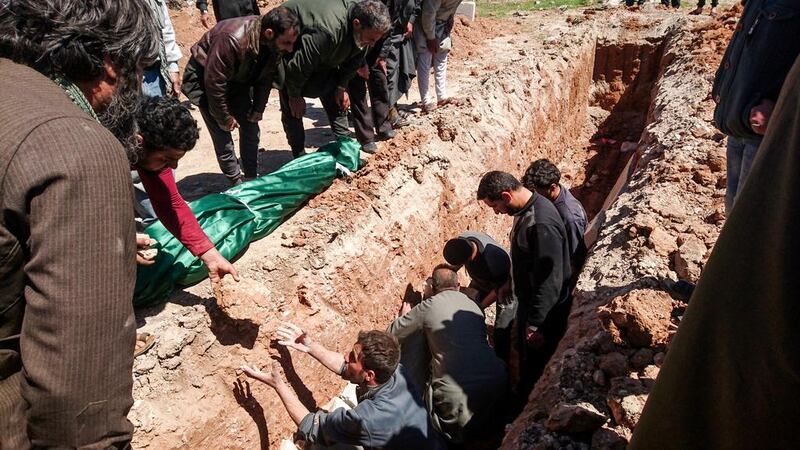THE HAGUE // Samples taken from the chemical weapons attack in Syria last week tested positive for the nerve agent sarin, the British delegation at the world’s chemical weapons watchdog said on Thursday.
“UK scientists have analysed samples taken from Khan Sheikhoun. These have tested positive for the nerve agent sarin, or a sarin-like substance,” the delegation said during a special session at the Organisation for the Prohibition of Chemical Weapons (OPCW) in The Hague.
The preliminary findings of technical experts concluded the allegations that chemical weapons were used on civilians in the rebel-held town of Khan Sheikhoun in Idlib province were “credible”. Eighty-seven people, including more than 20 children, died in the attack on April 4.
Earlier testing by Turkish authorities had also said the chemical used in the attack was sarin.
Yet in his first interview since the attack and the retaliatory air raid by the United States three days later, Syrian president Bashar Al Assad insisted that it was not his forces who dropped poisonous gas on the town of Khan Sheikhoun in rebel-controlled Idlib province. He went even further and said the entire incident was a fabrication, complete with faked video footage of dead children, who may not have been dead at all.
“It’s not clear what happened or not because how can you verify a video? “ he said. “You have a lot of fake videos now and you have the proof that those videos were fake. We don’t know whether those dead children were killed in Khan Sheikhoun. Were they dead at all? Who committed the attack, IF there was an attack? ... You have no information at all, nothing at all, no one investigated.”
When asked again if he thought the attack was a fabrication, Mr Assad replied, “Definitely, 100 per cent for us, it’s fabrication.”
There was also little sign that Syria’s greatest ally, Russia, has shifted its position. President Vladimir Putin, who had a surprise, two-hour meeting with US secretary of state Rex Tillerson on Wednesday, said the encounter had ended in deadlock. Washington echoed that appraisal with US president Donald Trump saying US relations were at “all-time low”.
When asked if the Tillerson-Putin meeting marked any positive change, Kremlin spokesman Dmitry Peskov said, “Too early yet”.
After a long day of what both sides called “detailed” talks, the Russians were still giving out mixed messages on Thursday. The Russian foreign minister Sergey Lavrov said he expected the OPCW to conduct an extensive probe into the chemical attack, and insisted experts from the organisation should go to both Khan Sheikhoun and to the Syrian airbase that was hit by 59 American missiles three days later. Yet almost simultaneously, Russia used its veto for the eighth time to kill the United Nations Security Council resolution condemning the chemical attack and calling for a thorough independent investigation into who and what was reponsibile for it.
Meanwhile, the Syrian army said hundreds of ISIL fighters as well as civilians were killed when an air raid by the US-led coalition hit a militant position in the eastern province of Deir Ezzour. The news was flashed on Syrian state television but was not verified by other news sources and denied by activists living in Deir Ezzour.
Britain – one of the sponsors of the defeated Security Council resolution – reacted to Mr Al Assad’s latest assertions with incredulity. Prime minister Theresa May said, “We believe it is highly likely that the attack was carried out by the Assad regime. Apart from anything else, we believe it’s the only regime that has the capability to make such an attack”.
* Associated Press and Reuters





